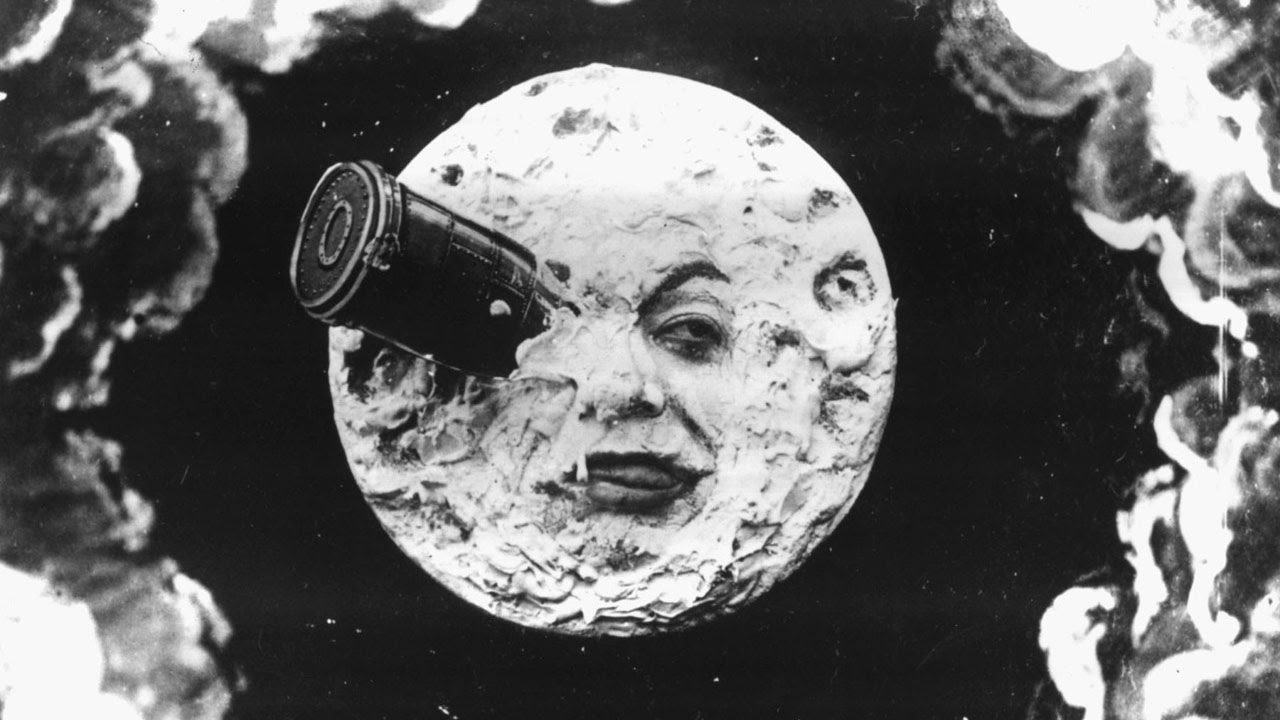
16/03/17
As A Short History of Film notes, A Trip to the Moon combined «spectacle, sensation, and technical wizardry to create a cosmic fantasy that was an international sensation.» It was profoundly influential on later filmmakers, bringing creativity to the cinematic medium and offering fantasy for pure entertainment, a rare goal in film at the time.
Le Voyage dans la Lune is a 1902 French silent film directed by Georges Méliès. Inspired by a wide variety of sources, including Jules Verne’s novels From the Earth to the Moon and Around the Moon, the film follows a group of astronomers who travel to the Moon in a cannon-propelled capsule, explore the Moon’s surface, escape from an underground group of Selenites (lunar inhabitants), and return to Earth with a captive Selenite. The film was an internationally popular success on its release, and was extensively pirated by other studios, especially in the United States.
A Trip to the Moon was one of the most complex films that Méliès had made, and employed «every trick he had learned or invented». It was his longest film at the time; both the budget and filming duration were unusually lavish, costing ₣10,000 to make and taking three months to complete. The camera operators were Théophile Michault and Lucien Tainguy, who worked on a daily basis with Méliès as salaried employees for the Star Film Company.
The Arrival of a Train at La Ciotat Station
Is an 1895 French short black-and-white silent documentary film directed and produced by Auguste and Louis Lumière.
This 50-second silent film shows the entry of a train pulled by a steam locomotive into a train station in the French coastal town of La Ciotat. Like most of the early Lumière films, L’arrivée d’un train en gare de La Ciotat consists of a single, unedited view illustrating an aspect of everyday life.
The film is associated with an urban legend well-known in the world of cinema. The story goes that when the film was first shown, the audience was so overwhelmed by the moving image of a life-sized train coming directly at them that people screamed and ran to the back of the room. Hellmuth Karasek in the German magazine Der Spiegel wrote that the film «had a particularly lasting impact; yes, it caused fear, terror, even panic.» However, some have doubted the veracity of this incident such as film scholar and historian Martin Loiperdinger in his essay, «Lumiere’s Arrival of the Train: Cinema’s Founding Myth».
Louis Lumière eventually re-shot L’Arrivée d’un Train with a stereoscopic film camera and exhibited it (along with a series of other 3D shorts) at a 1935 meeting of the French Academy of Science
Short Films & Future Films, INCORTO.com
Nuestra misión es aportarle herramientas a los creadores de cine de todo el mundo, para que exhiban y distribuyan su trabajo. INCORTO llega a cientos de espectadores y cinéfilos a través de INCORTO Film Festival y el Canal de Cine INCORTO, el cual dona parte de sus ganancias a los cineastas y realizadores.
Nuestra visión está dirigida por completo al cine. Queremos que el cine de autor se posicione con nuevas herramientas, que los cineastas reciban ganancias en respuesta al trabajo realizado y que los cinéfilos tengan un lugar en donde disfruten películas de todo el mundo y que nunca han visto.
Access to INCORTO SA. De CV. is granted for exhibition, distribution and producing purposes only.
Some of the content available through INCORTO may be governed by local, national, and/or international laws and regulations, and your use of such content is solely at your own risk. You agree to abide by all applicable laws and regulations, including intellectual property laws, in connection with your use of INCORTO. In particular, you certify that your use of any part of our content will be limited to noninfringing or fair use under copyright law.
In using the INCORTO site collections, and/or services, you further agree (a) not to violate anyone's rights of privacy (b) not to collect or store personal data about anyone, (c) not to infringe any copyright, trademark, patent, or other proprietary rights of any person, (d) not to transmit or facilitate the transmission of any content available.
INCORTO may modify this agreement from time to time, and your continued use of the collections and/or the site constitutes your acceptance of any and all modifications.
Because the content of the collections comes from around the world and from many different sectors, the collections may contain information that might be deemed offensive, disturbing, pornographic, racist, sexist, bizarre, misleading, fraudulent, or otherwise objectionable. INCORTO guarantee that the content available in the collections is accurate, complete, noninfringing, or legally accessible in your jurisdiction, and you agree that you are solely responsible for abiding by all laws and regulations that may be applicable to the viewing of the content. In addition, the collections are provided to you on an as-is and as-available basis. You agree that your use of the site and the collections is at your sole risk.
By Source Code